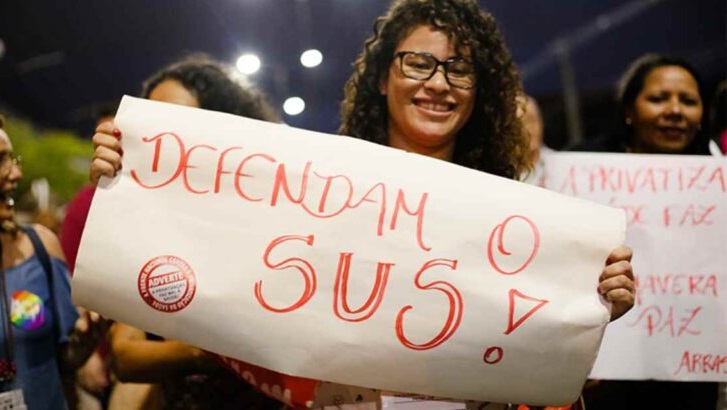The 17th National Health Conference will be held in Brasília from July 2 to 5. Over 4,000 people have been elected as delegates to vote on 2,000 proposals and guidelines for the next period of the Unified Health System (Sistema Único de Saúde, SUS). These plans were developed through conferences at the municipal and state level, as well as over 100 meetings which were open to the public, all of which were held between August 2022 and May 2023. The preparation process for this national event mobilized nearly 2 million health workers, managers, patients, activists, and others from all over the country.
The National Health Conferences are a vital platform for dialogue between government and civil society, representing what is known in Brazil as Social Control. Social Control is a fundamental pillar of the SUS, and encompasses the people’s understanding, participation, and oversight of the State’s actions. It provides an experience of direct democracy led by the people. By engaging in social control, citizens can contribute to the planning, implementation, and evaluation of government activities.
The National Conference is held every four years by the National Health Council in collaboration with the Ministry of Health. Health Councils, mandated by law, exist at all levels (municipal, state, and federal) and serve as spaces for Social Control. They have a permanent and deliberative role in formulating strategies and overseeing the execution of health policies, including economic and financial aspects.
Half the members on the councils are representatives of SUS users (population, associations, social movements, etc.) while 25% are health professionals (doctors, nurses, unions, etc.) and 25% are service providers and managers (government representatives, philanthropic or contracted institutions).
Throughout the history of public health in Brazil, there have been 16 conferences, both before and after the formation of the SUS. The 8th conference, held in 1986, holds particular significance as it was the first conference open to society. Its final report formed the basis for the health chapter in the Brazilian Federal Constitution of 1988, which put an end to the dictatorship and resulted in the creation of the SUS.
Defense of the strengthening of SUS
The 17th Conference shares similarities with the 8th conference as it is characterized by the enthusiasm following the end of an authoritarian political period. However, this period was also tragic for the population due to its detrimental impact on people’s health and lives. Under the administration of former president Jair Bolsonaro, Brazil suffered over 700,000 deaths due to the COVID-19 pandemic.
Due to a federal response based on denialism and misinformation, the country, which has for only 3% of the global population, accounted for more than 10% of worldwide deaths. In addition to underreporting cases, it is known that serious measures to combat the pandemic could have prevented approximately half of these deaths.
Read | Bolsonaro ruled politically ineligible for eight years
The tragedy could have been even worse if it weren’t for the SUS and its dedicated workers who ensured health services for the population. In response to this period, Brazilian society recognized the importance of the SUS. Despite attacks on science-based strategies to fight the pandemic, the majority of the population embraced vaccination. Today, there is an unprecedented level of social support for the SUS, which is reflected in the participation and election of numerous delegates in preparation for the Conference.
This is also an important moment to defend the health project chosen in last year’s Brazilian elections, implemented by Health Minister Nísia Trindade and President Luís Inácio Lula da Silva’s administration. Even with their electoral victory, the current government and its progressive agenda require social and political strength to continue. In the first six months of their administration, the government faced challenges in implementing its programs due to resistance from conservative sectors, particularly in the Brazilian National Congress.
The current president of the Chamber of Deputies and leader of a group of conservative congressmen, Arthur Lira, has been demanding greater political influence within Brazil’s executive branch by blackmailing legislative processes that guarantee the implementation of President Lula’s policies. Last month, Lira expressed an interest in replacing the current health minister with one of his allies. However, this possibility was promptly dismissed by both the minister and the president.
Organizers and supporters of the 17th Conference view the event as a significant display of political strength in defense of the SUS. This commitment to the SUS was established in agreement with President Lula during the Free, Popular, and Democratic Health Conference held in August 2022.
Moreover, the Conference was scheduled for early July to allow ample time for contributions to the National Health Plan 2024-2027. This plan serves as a guiding instrument for SUS planning, based on the extensive and diverse national debate. It aims to align with the overarching Pluriannual Plan of the government.
Another reason for choosing the date is the upcoming vote in August on the Budget Guidelines Law. This law is formulated annually to outline the government’s priorities for the following year. The mobilization for health during the Conference in Brasília is expected to influence the budget, ensuring a transformation in the quality of healthcare for the Brazilian population. It also emphasizes the collaborative and participatory development of an agenda between society and the government.
Program
The Conference anticipates hosting approximately 6,000 attendees, making it the largest such event in history. The program includes various activities such as debates, plenary sessions, and an Opening Ceremony which will be attended by President Lula and Health Minister Nísia Trindade.
On July 4th, there will be a public demonstration in support of the SUS, life, and democracy. Additionally, the Conference will incorporate a program of art, education, and popular culture.
The schedule of the conference can be found here (in Portuguese).
People’s Health Dispatch is a fortnightly bulletin published by the People’s Health Movement and Peoples Dispatch. For more articles and to subscribe to People’s Health Dispatch, click here.





